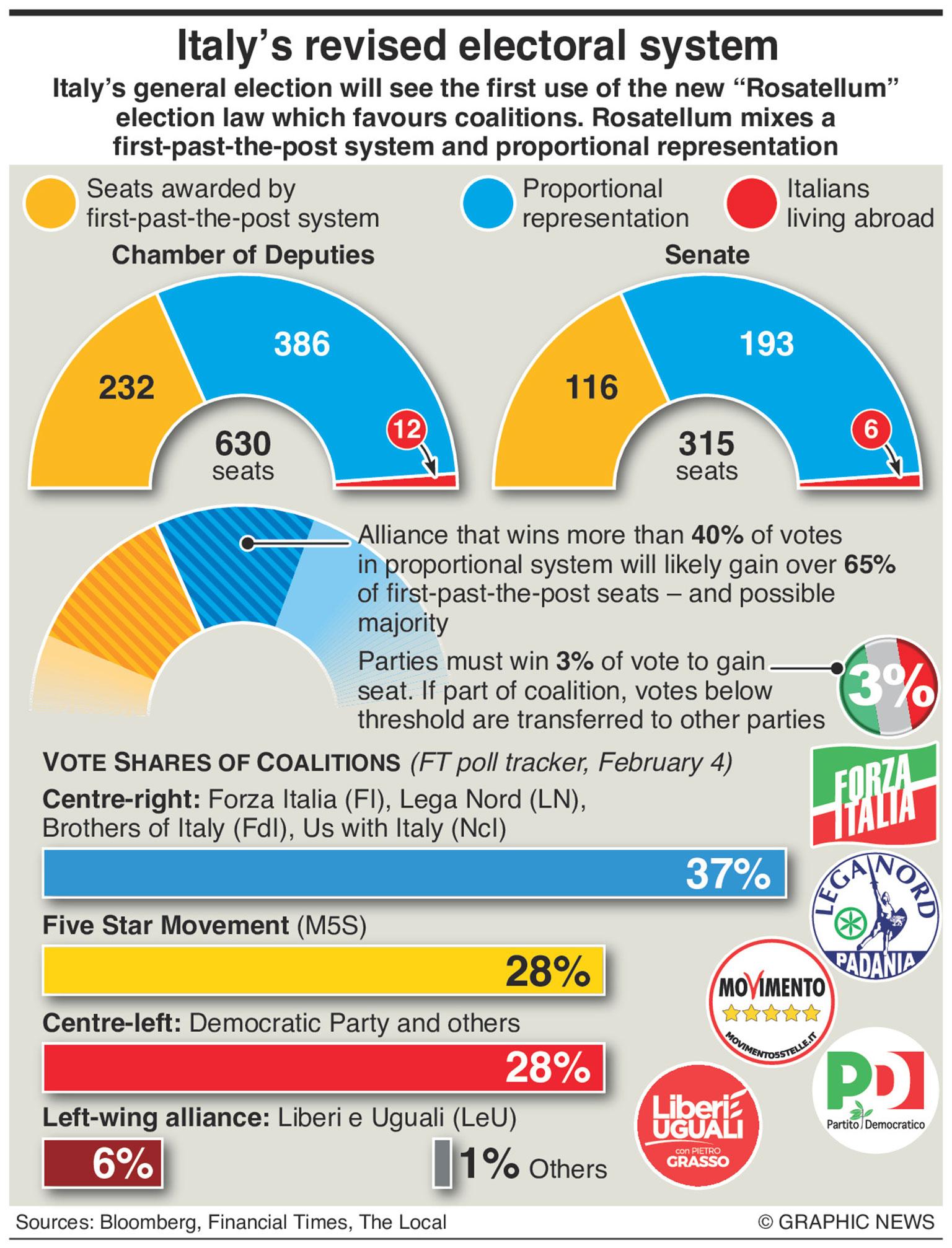Italy election 2018: Untried voting system could return victory for Berlusconi's right-wing coalition
But pollsters admit anything could happen

Your support helps us to tell the story
From reproductive rights to climate change to Big Tech, The Independent is on the ground when the story is developing. Whether it's investigating the financials of Elon Musk's pro-Trump PAC or producing our latest documentary, 'The A Word', which shines a light on the American women fighting for reproductive rights, we know how important it is to parse out the facts from the messaging.
At such a critical moment in US history, we need reporters on the ground. Your donation allows us to keep sending journalists to speak to both sides of the story.
The Independent is trusted by Americans across the entire political spectrum. And unlike many other quality news outlets, we choose not to lock Americans out of our reporting and analysis with paywalls. We believe quality journalism should be available to everyone, paid for by those who can afford it.
Your support makes all the difference.A new, untried electoral system and a large number of undecided voters means Italy’s election in March is highly unpredictable and there are several alternative coalition governments that could emerge, pollsters say.
“To predict the next government you need a wizard, not a pollster,” said Antonio Noto, head of the IPR polling agency. “The only thing I am sure of is that the result won’t be what the polls suggest at the moment.”
All surveys in the last six weeks say the anti-establishment Five Star Movement will get the most votes, but because it has not formed an alliance with any other groups it has virtually no chance of winning a parliamentary majority on its own.
On the other hand a coalition of smaller, conservative parties led by Silvio Berlusconi’s Forza Italia (Go Italy!), outstrips Five Star in both votes and probable seats, and may possibly win a working majority, pollsters say.
Whether it does so depends not only on its overall tally of votes but also, crucially, on how it performs in dozens of marginal, first-past-the-post constituencies mainly in southern Italy.
Under the hybrid voting system approved by parliament in October, 64 per cent of seats will be elected by proportional representation (PR). The rest will come from winner-takes-all districts which did not exist under the previous PR system.
“The election will be decided in the first-past-the post seats,” said Federico Benini, head of the Winpoll agency.
Mr Benini said the centre right will probably win a large majority of these seats in the industrial north of Italy where it is strongest, and will battle with Five Star in the poorer south where the anti-system party has its heartland.
The ruling Democratic Party (PD) lags behind both the centre right and Five Star, and pollsters say it has little chance of winning the election either on its own or as part of a centre-left coalition of tiny satellite parties.
Mr Benini said the PD may not win a single first-past-the post seat in the southern half of the country.
Polls give Five Star 27-29 per cent of the overall vote, the PD 22-25 per cent and the centre right 35-39 per cent.
It has been widely reported that the centre right needs 40 per cent of the vote to have a chance of a parliamentary majority, but pollsters say this is simplistic.

IPR’s Mr Noto said if the centre right fared well in the winner-takes-all seats it could get a majority with as little as 36 per cent of the vote. Conversely, if its first-past-the-post candidates did less well, even 42 or 43 per cent may not suffice.
Roberto D’Alimonte, a politics professor at Rome’s Luiss University, calculated it would need 40 per cent of the proportional vote and 70 per cent of first-past-the-post seats to get a wafer-thin majority in the lower house.
In the last week three agencies, SWG, Ixe and Index, have projected that the centre right would win around 290 lower house seats, compared with the 316 needed for a majority.
However, many pollsters say such estimates have a large element of guesswork and a wide margin of error. Mr Noto said they should be taken “with a large pinch of salt”.
Another factor which makes the election hard to call is the extremely large number of undecided voters – up to 38 per cent – who pollsters say normally only make up their minds a few days before the vote and will probably decide its outcome.
Mr Benini said he was “convinced” many of these would vote for Five Star, which would do better than polls suggest as it did in the last election in 2013. He forecasted the PD, which has steadily lost votes since 2014, would do worse than expected.
Mr Noto said many undecided voters were former PD supporters who were more likely to opt for Five Star than the centre right.
Pollsters say the vote could yield various ruling alliances. If the centre right falls short, Forza Italia could split with its right-wing Northern League allies and hook up with the PD, or Five Star could join forces with the Northern League. At the same time, none of these permutations may have enough seats to govern.
“I don’t know what to expect,” said Renato Mannheimer, head of the Eumetra MR agency. “So many voters decide at the last moment, and a 2 or 3 per cent shift can change everything.”
Reuters
Subscribe to Independent Premium to bookmark this article
Want to bookmark your favourite articles and stories to read or reference later? Start your Independent Premium subscription today.
Join our commenting forum
Join thought-provoking conversations, follow other Independent readers and see their replies
Comments